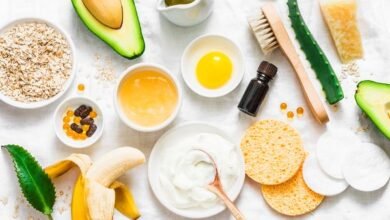What is Roaccutane?

What is Roaccutane?
What is Roaccutane?
Roaccutane is the brand name for isotretinoin , an anti-bleeding retinoid derived from vitamin A, intended for the treatment of severe acne, acne rosacea, and acne resistant to other forms of treatment, such as topical ointments. This substance has the ability to reduce the activity of the sebaceous glands and local inflammation , which leads to greater control of acne.
In addition to its action against pimples and blackheads, isotretinoin has shown effective results in treatments against aging of the skin, as the substance prevents damage caused by UV rays, thus preventing collagen degradation.
“In this case, one should consider whether using isotretinoin for this purpose would actually bring more benefit or harm to health, due to the adverse effects that usually arise during treatment,” notes Heloisa Olivan, a biochemist and cosmetologist at the Olivian Institute.
The effect of Roaccutane on the skin
Acne frames usually develop due to an overproduction of sebum in the skin by the sebaceous glands, as well as a concentration of dead cells in the skin’s hair follicles, which leads to a buildup of bacteria and inflammation – resulting in pimples and blackheads.
In this sense, isotretinoin acts directly on the sebaceous gland by binding to specific receptors for retinoids, thereby reducing the production of sebum in the skin. With less oil, the risk of pore clogging is greatly reduced. After a few weeks of use, a reduction in the inflammatory process that leads to acne can be seen.
Roaccutane treatment
Because of its contraindications and potential side effects, isotretinoin is indicated only when previous treatments based on topical products and antibiotics have not been effective in combating acne. In this context, a dermatologist will assess the severity of each case.
Initially, according to Dr. Heloisa Olivian, an assessment of the patient’s general health status should be made. Blood count data such as blood glucose, liver function, cholesterol and triglyceride levels are of paramount importance. In addition, the specialist emphasizes, lifestyle habits, such as diet, adherence to skin routine, age and weight, are important points to consider before starting treatment.
The dose of Roaccutane is calculated after consulting a doctor based on the person’s weight, and the average duration of treatment is six months. However, depending on the severity of the condition and the specific characteristics of the patient, treatment can last for a year or as little as six months.
Currently, oral isotretinoin is considered safe for patients 12 years of age or older. However, according to dermatologist Fabiana Seidel, a member of the Brazilian Dermatological Society, treatment for children under the age of 21 should be done with the consent of parents or guardians.
When will the results begin to appear?
The first results of treatment can be seen 8 to 16 weeks after starting Roaccutane, with a tendency towards a gradual improvement in the condition. According to Heloisa Olivian, the vast majority of patients have an excellent long-term response, with effects persisting after the end of treatment.
However, even after the drug is stopped, some patients still need to continue with other topical treatments.
“The good news is that after using isotretinoin, these less aggressive treatments, which have not been previously successful, begin to have a significant response. In general, about 90% of patients are satisfied with the results,” says the expert.
After 15 to 20 weeks of treatment, about 40% of patients experience definitive acne treatment.
After treatment, can acne come back?
Although the odds are low, about 2% of cases are more resistant to Proacutane treatment. In this context, a dermatologist can extend the use of isotretinoin for another one to three months. Ideally, an interval of at least five months is given for repeat treatment.
However, specialist Heloisa Olivan explains that relapses appear more frequent when lower daily or total doses are used, as well as other factors, such as:
- hormones
- Stress
- not enough food
- lack of hygiene
- Improper use of cosmetics during skin care
- use masks
Care during treatment
Isotretinoin’s action in the body requires the patient to have monthly checks, such as a complete blood count, to monitor levels of liver enzymes as well as levels of triglycerides and cholesterol in the blood.
Donating blood should be avoided during and for the first month after treatment ends to prevent accidental exposure and potential risks to the fetuses of pregnant women undergoing transfusions, Heloisa Olivan explained.
In addition, maintaining a proper skin care routine, prioritizing good cleansing and moisturizing , as well as using sunscreen and drinking plenty of water are essential to get a more effective result from using Roaccutane. It is necessary to follow all medical recommendations to avoid side effects that may arise.
In case of dry nostrils, dermatologist Ademar Schultz recommends applying drops of saline solution or a thin layer of petroleum jelly to the inner edges of the nose. The use of artificial tears, previously indicated by the doctor, can help in the treatment of dry eyes.
Healthy lifestyle habits
In addition to these precautions, Dr. Heloisa Olivan also stresses the importance of maintaining a healthy diet and minimizing alcohol consumption during treatment. Since isotretinoin can alter cholesterol levels in the body, you should also avoid consuming fatty, sugary, and high-carb foods.
It is still recommended that you not perform any kind of abrasive procedures on the skin while using Roaccutane, such as peeling , peeling, and laser treatments, as the medication can alter the healing of the skin and may even worsen the condition. Waxing is also not recommended during and for six months after treatment, as it can help with dermatitis and scar formation on the skin.
Finally, regarding the coronavirus, Dr. Heloisa Olivan stated that “no relationship has been established, to date, between the use of isotretinoin in patients with acne and risk of infection or change in the development of COVID-19.”
Read more: 10 skin care habits that can make acne worse
Roaccutane interactions and side effects
At first, a sharp worsening of acne occasionally appears in the first period of treatment, which is called a flare , according to Dr. Fabiana Seidl. This is because Roaccutane stimulates the skin to expel excess sebum from within the sebaceous glands. In general, this deterioration does not require dose adjustment.
The most common side effects that can occur during isotretinoin treatment are dry skin, lips, eyes, and nose, as well as muscle aches, nausea, and headache. In addition, as Heloisa Olivan explains, there may be the occurrence of:
According to the specialist, anemia is a reaction that occurs in about 10% of patients undergoing isotretinoin therapy, as well as an increase in liver enzymes.
In addition, although rare, cases of intracranial hypertension, gastrointestinal upset and severe allergic reactions, requiring immediate medical attention and discontinuation of treatment, have been reported.
Does Roaccutane cause depression?
Depression is a side effect listed in the Roaccutane leaflet. However, there is no epidemiological, pharmacological and clinical evidence of a relationship between isotretinoin use and the onset or exacerbation of depression and other affective disorders.
A study published in the Journal of the American Academy of Dermatology (JAD) in 2019 notes that a cause-and-effect association between isotretinoin use and psychiatric symptoms cannot yet be proven.
“A significant portion of patients with already severe acne develop psychiatric symptoms, low self-esteem and other risk factors for depression, which may contribute to the association between medication and depression,” explains Dr. Heluisa Olivian.
Contraindications to the use of Roaccutane
Being a teratogen , isotretinoin is contraindicated for pregnant women or women at risk of becoming pregnant during treatment, as isotretinoin can cause serious malformations in the fetus, as well as affect the nervous and cardiovascular systems – regardless of the amount administered to the woman.
According to data from the Brazilian Society of Dermatology (SBD), the risk of having a child with a congenital malformation due to the action of Roaccutane is up to 30%. There is also a high risk of miscarriage, premature birth, or death of the baby.
Even for women with a history of infertility or who have said they are not sexually active, effective contraceptive measures are required throughout treatment and up to 60 days after using isotretinoin.
According to Brazilian legislation, before starting treatment with Roaccutane, it is necessary to sign a consent form about the risks related to pregnancy.
Moreover, according to specialists Ademar Schultz and Heloisa Olivan, isotretinoin is also contraindicated for patients with:
- Cholesterol or triglyceride disorders
- The diabetes which is depending on the insulin
- Liver diseases
- Kidney disease
- Hypersensitivity to the drug or to any of its ingredients, such as soy
- Presence of hypervitaminosis A
- systemic diseases
- epilepsy
- psychosis
- Depression
Risks of misusing Roaccutane
Roaccutane should only be given with a prescription and strictly monitored by a dermatologist, who will know the appropriate dose and time of treatment for each patient. The indiscriminate use of the substance, according to the Brazilian Society of Dermatology, leaves the patient vulnerable to many serious side effects.
Where do you find?
Roaccutane can be found in drugstores or pharmacies as 10 mg or 20 mg capsules and is only sold with a doctor’s prescription and with a prescription maintained by the establishment.



